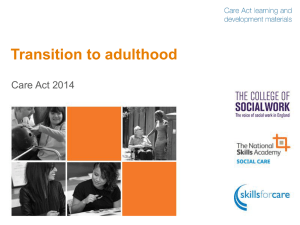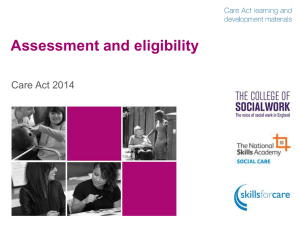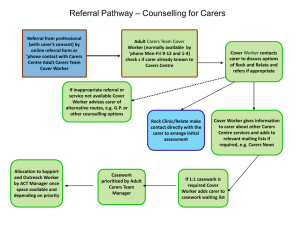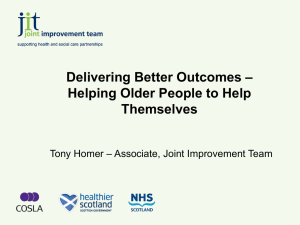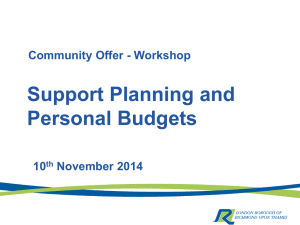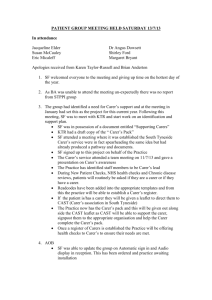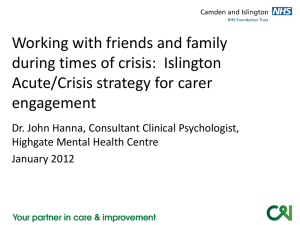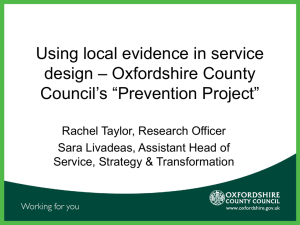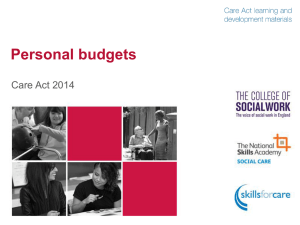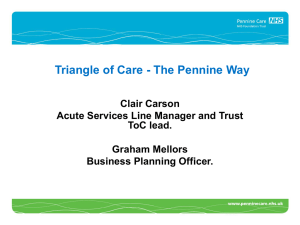Parents becoming partners in decision making
advertisement
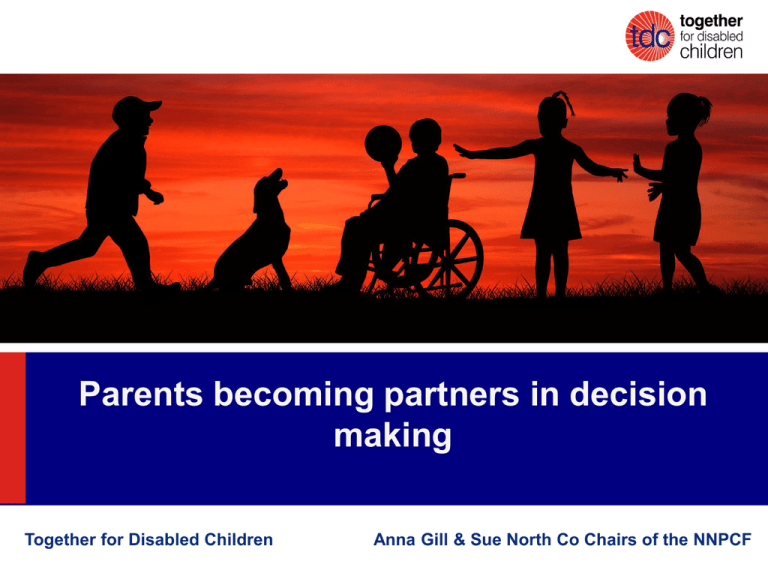
Parents becoming partners in decision making Together for Disabled Children Anna Gill & Sue North Co Chairs of the NNPCF What did the world look like before AHDC? • Involvement and participation of parents sporadic • Some pockets of good practice across the country • Piecemeal and inconsistent • Voice of parent carers largely unheard Aiming High for Disabled Children • Focus on partnership working • Funding stream attached – Local Area grants to develop Parent Carer Forums • TDC commissioned to support the process Where are we now? Parents as partners becoming the “norm” • 152 Local Areas –approved for funding but still great variation in development • 97% - have parents on decision making bodies • 100% - report significant improvement in participation and increased numbers of parent carers involved • 95% - are reaching more parent carers • 95% - report improved joint working “Something quite magical happens when people sit down together, talk, listen and work things out. Barriers come down, fear and ignorance flies out the window, and respect, understanding and goodwill takes its place. With parents actively involved in shaping services based on what we know our children and families need, every penny of funding is put to better use. With the economic difficulties now facing us all, this wise and effective use of financial resources is crucial”. Parent from Sutton Forum Progress reflected locally mirrored nationally • Local Parent Carer Forums have and are developing to become partners in strategic planning, decision making and evaluation • Needed to ensure this was reflected at a National Level in relation to National Planning and Developments • Led to the Development of the National Network of Parent Carer Forums (Task Group) Why a National Network? One parent carer voice to: address big issues champion specific themes identify common priorities To share information and experiences so that service delivery can be influenced at a national level ‘Our Strength is in Our Shared Experience’ The National Network Task Force • 10 Task Force Members • All parent carers experienced in participation • Tasked with the creation of the national network over the coming 12 months • Supported by TDC • Profiles of all members in briefing document www.togetherfdc.org Aims of the National Network ‘The aim of the National Network of Parent Carer Forums is to ensure that good practice, knowledge and shared expertise continues to grow and strengthen at the end of the TDC programme and to develop a cohesive and coherent structure to sustain and develop the effectiveness of parent carer groups across England, individually and as a collective voice.’ Development of Regional Networks • 9 Regional Networks have also been established to enable local Parent Carer Forums to meet regularly, and share good practice, and provide peer support • Currently facilitated with support from TDC Parent Participation Advisors Communication pathway National Bodies la la la NNPCF la la la Regional Forum la la la All Regional Forums la National Network Response to Consultations National responses provided to: • DoH White Paper – Liberating the NHS • DfE Green Paper -Call for Views • Responses based on the feedback from local and regional Parent Carer Forums • Huge unanimity in main responses • All local Parent Carer Forums received copies of responses also on TDC website Benefits of Parent Participation • Its best practise but also common sense! • Better outcomes for children and families • Helps LAs to meet their Legal Duty to involve • Higher take up of services- emerging evidence shows there is better reach and range of Short Breaks leading to fewer children becoming Looked After Value for Money. • 49% of LAs said parent participation has led to cost benefits. • 93% consulted with parents about their satisfaction of services. 84% used the feedback in their planning of services. “Without a doubt our short break programme has delivered not what we thought people needed but what people actually wanted. As a result we have delivered a hugely successful programme at a low cost per unit price, enabling us to support more families and work on our strategy to reduce high cost places” Value for Money • “Fewer families in crisis less emergency response needed” • “We have carried out a value for money exercise and the unit cost of our commissioned group based specialist service has decreased year on year of the Aiming High programme. This is due to attendance at the groups increasing and to parents becoming more confident in service providers and telling other parents about their experiences”. Value for Money cont. A summer play scheme for 35 children at risk of being looked after, cost a total of £90,000 for a six week period. The total cost of a residential placement for the same number of children for the same period would have been £807,660 the scheme resulted therefore in cost savings of £717,660 In one Local Authority, they estimated the cost savings in preventing just a few children from entering the looked after system exceeds the total short break revenue grant for the whole year. Other benefits of parent participation • Peer support – overcomes isolation and provides focus and encouragement • Parents volunteering • Parents employed as participation workers, mentors, champions and enablers. • Parents as trainers – workforce development • Parent Carer Forums delivering services The Big Society Parent Participation links directly to ethos of the Big Society The development of parent carer forums and parent carer participation supports the three main tenets of the big society; • Social action. • Public service reform. • Community empowerment. • Still so much to do in an unknown future.... Together we can make a difference, but now is NOT the time to give up!

